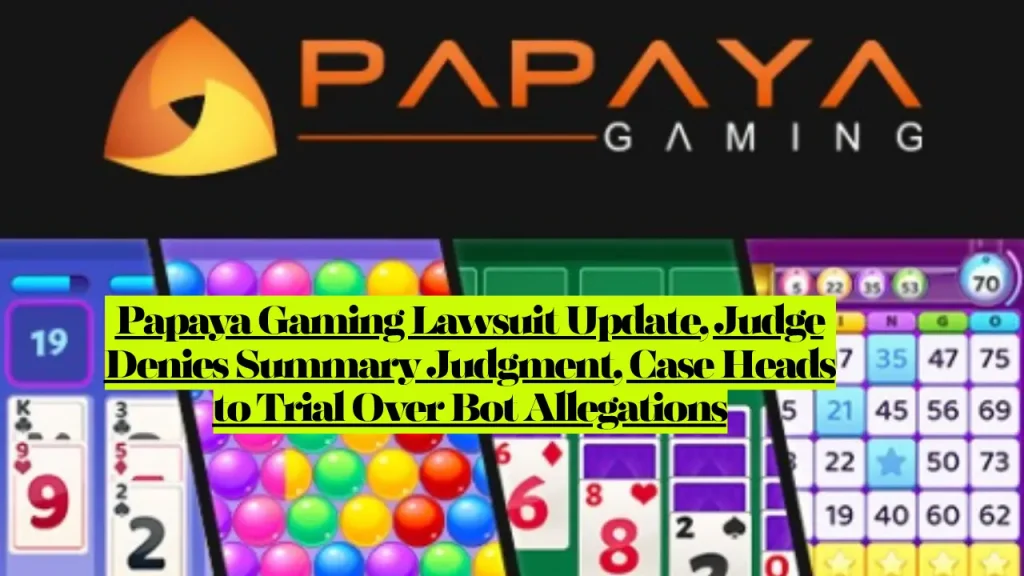Papaya Gaming Lawsuit Update, Judge Denies Summary Judgment, Case Heads to Trial Over Bot Allegations
On October 27, 2025, Judge Denise Cote denied Papaya Gaming’s motion for summary judgment in the Southern District of New York, allowing fraud and false advertising claims filed by competitor Skillz Platform Inc. to proceed toward trial. The judge found it “undisputed that Papaya used tailored bots to control the outcomes of tournaments” in games marketed as “totally fair and skill-based” between 2019 and at least November 2023.
The ruling marks a major setback for the Israel-based mobile gaming company behind popular apps like Solitaire Cash, Bubble Cash, Bingo Cash, Cookie Cash, and 21 Cash. Days after the court decision, ESPN reportedly ordered multiple on-air personalities—including Stephen A. Smith, Dan Orlovsky, Mina Kimes, and Laura Rutledge—to end promotional partnerships with Papaya Gaming.
What Is the Papaya Gaming Lawsuit?
Skillz Platform Inc. sued Papaya Gaming in March 2024, alleging violations of the Lanham Act and New York General Business Law § 349 through false advertising. The core allegation: Papaya marketed its multiplayer mobile games as human-versus-human skill competitions while secretly using computer bots disguised as real players.
Papaya operates mobile games where users deposit money and compete for real cash prizes, typically matching 5-20 players in tournaments using an algorithm that ranks players by skill level. Skillz runs a competing platform hosting third-party developers’ games with head-to-head gameplay between two players.
The lawsuit centers on whether Papaya deceived customers about the nature of competition in its real-money skill-based games.
Legal Claims Involved
Federal and State False Advertising
Skillz claims Papaya violated the Lanham Act and New York GBL § 349 by falsely advertising that its games pit human players against each other when Papaya actually employed bots against human players. The advertising described games as “fair” and “skill-based” with competitions between “players” and “individuals” “over the age of 18.”
Papaya also represented it had “no vested interest” in tournament outcomes and didn’t “profit” from who wins or loses.
Unjust Enrichment and Damages
According to a Skillz expert, the company suffered “actual damages” of $637 million, while Papaya was unjustly enriched by as much as $719 million. During Papaya’s bot era, Skillz saw decreased market share while Papaya’s increased, with Papaya regularly identifying Skillz as its largest competitor.
Related article: How Much Does a Lawyer Make a Year? The $120,000 Gap Nobody Talks About

Who Are the Parties Involved?
Plaintiff: Skillz Platform Inc.
A Las Vegas-based mobile gaming platform that hosts games created by third-party developers for head-to-head real-money competitions. Skillz markets itself as committed to fair play, matching users with real players of equal skill.
Defendants: Papaya Gaming Ltd. and Papaya Gaming Inc.
Israel-based mobile game developer operating popular cash-prize apps. Papaya’s games allow users to deposit money and earn real cash prizes along with in-game currency, typically in multiplayer tournaments with larger prize pools than Skillz’s head-to-head format.
Additional Parties
Papaya filed counterclaims naming Skillz and third-party developers Tether Studios LLC and Golden Wood Company Ltd. as counterclaim defendants for alleged trademark and copyright infringement.
Court Jurisdiction and Procedural History
Venue: United States District Court for the Southern District of New York
Case Number: 1:2024cv01646
Presiding Judge: Judge Denise L. Cote
Key Timeline:
- March 4, 2024: Skillz initiated the lawsuit against Papaya
- May 6, 2024: Papaya moved to dismiss
- July 23, 2024: Judge denied Papaya’s motion to dismiss in its entirety
- August 5, 2024: Papaya filed counterclaims against Skillz and five other companies
- March 26, 2025: Judge denied Papaya’s motion for leave to file second amended counterclaims
- June 27, 2025: Papaya filed motion for summary judgment
- October 27, 2025: Judge denied Papaya’s summary judgment motion, clearing the path to trial
What Did the Judge Find?
Judge Cote wrote it is “undisputed that Papaya used tailored bots to control the outcomes of tournaments,” allowing the company to “prevent players from winning — or allow them to win — no matter how they performed in the game”.
Evidence of Bot Use
The court found sufficient evidence for a jury to determine literal falsity or falsity by necessary implication in Papaya’s advertising statements about “fair,” “skill-based” tournaments between “players” and “individuals” over 18.
Internal Papaya communications showed one employee stating: “While understanding the need for bots, the margin of their winnings should be smaller and less obvious to our players”.
Papaya’s Response Under Oath
During discovery, Papaya executives asserted their Fifth Amendment right to remain silent during depositions and did not offer affidavits supporting their summary judgment motion.
Papaya’s designated Rule 30(b)(6) witness testified that instances where customer support told customers Papaya didn’t use bots were “an unfortunate mistake” by the vendor and “not Papaya’s position,” but executives never made similar representations themselves.
Consumer Confusion Evidence
Skillz offered extrinsic evidence showing consumer confusion created by Papaya’s use of terms like “skill-based,” “fair,” “players,” “winners,” “individuals,” and “no vested interest” in advertising.
Papaya told customers over 200 times that “we do not use bots” and closed accounts of multiple players who expressed bot suspicions, while removing posts mentioning bots from its Facebook group.
Papaya’s Counterclaims
Papaya filed counterclaims accusing Skillz of false advertising by creating a “fabricated website” called 4FairPlay.org that spread false allegations against competitors and sought to deceive consumers into believing Papaya’s games were rigged.
Papaya also filed a separate federal lawsuit in Virginia’s Eastern District alleging Skillz hired consultants in Chicago and New York to craft 4FairPlay.org and promote “phony customer testimonials”.
According to Papaya’s counterclaims, Skillz also uses bots despite presenting itself as the only trustworthy industry player, and this lawsuit is part of a litigation strategy for a company “in the midst of a financial downturn that has lasted for three years”.
Separate Consumer Class Action Lawsuit
A separate consumer class action lawsuit, Kelly-Starkebaum v. Papaya Gaming Ltd. (1:24-cv-02310), was filed in March 2024 in the same court. Judge Cote granted Papaya’s motion to compel arbitration on December 17, 2024, staying the action pending arbitration proceedings.
Attorneys working with ClassAction.org are investigating whether Papaya “secretly pit players against computer bots disguised as human opponents, even when money is on the line,” using these bots “to control the outcome of each contest, turning these so-called ‘skill-based’ competitions into manipulated games of chance where the company gets to pocket winnings whenever it chooses”.
Impact on Gaming Industry
Regulatory Implications
Judge Cote noted that with bot use, Solitaire Cash could be classified as a “gambling platform” rather than a “skill-based” gaming platform, potentially subjecting Papaya to regulatory and tax requirements for gambling platforms and possibly losing access to app stores and payment processors.
In October 2024, the Michigan Gaming Control Board ordered Papaya to cease operations in the state, determining its games constituted illegal gambling under Michigan law after an investigation following an anonymous tip.
Celebrity Endorsement Fallout
ESPN personality Stephen A. Smith was named global ambassador for Papaya’s World Solitaire Championship in November 2025. Following the legal developments, Smith stated: “We’re aware of the recent legal developments involving Papaya and the broader skill/gaming space. My team is currently evaluating the accuracy and merits of the claims made. I want to be very clear. I do not support nor condone any company engaging in fraudulent or unfair gaming practices”.
ESPN analyst Mina Kimes publicly severed ties over the weekend, calling her involvement “a colossal f**k up” and admitting she failed to properly vet the company before signing on.

What Happens Next?
The case proceeds to trial where a jury will evaluate:
- Whether Papaya’s advertising was literally false or false by necessary implication
- Whether the false advertising was material to consumers
- Whether Skillz suffered injury from Papaya’s conduct
- Damages and potential remedies
The court severed Papaya’s trademark and copyright counterclaims for separate adjudication, allowing the primary false advertising claims to proceed on the established discovery schedule.
Both parties continue discovery with summary judgment and pretrial motions ahead before trial.
Common Misconceptions About the Papaya Gaming Lawsuit
Misconception #1: Papaya Stopped Using Bots
While Papaya’s counsel stated at a May 10, 2024 conference that “the games as currently constituted do not use bots. Every single opponent is a human opponent,” the court found undisputed evidence of bot use from 2019 through at least November 2023. The current operational status remains contested.
Misconception #2: This Only Affects Skillz
The lawsuit has broader implications for the entire real-money skill-based mobile gaming industry, raising questions about disclosure requirements, regulatory classification, and consumer protection across platforms.
Misconception #3: Papaya Admitted to Using Bots
A Bonus.com article portrayed Papaya as having “admitted” to using bots during litigation, but Bonus.com ultimately retracted that statement and issued a correction. However, the court found the bot use itself undisputed based on evidence in the record.
FAQs About the Papaya Gaming Lawsuit
What is the current status of the Papaya Gaming lawsuit?
On October 27, 2025, Judge Denise Cote denied Papaya’s motion for summary judgment, allowing Skillz’s false advertising and Lanham Act claims to proceed to trial. The case remains active in the Southern District of New York.
What games are involved in the lawsuit?
Papaya’s mobile games including Solitaire Cash, Bubble Cash, Bingo Cash, Cookie Cash, and 21 Cash are at the center of the allegations about bot use in real-money competitions.
Can consumers join the lawsuit?
A separate consumer class action was compelled to arbitration in December 2024. Attorneys working with ClassAction.org are handling consumer claims through mass arbitration rather than class action lawsuits, with no upfront cost to participants who only pay if attorneys win their claims.
Did Papaya executives testify about bot use?
No. During discovery, Papaya executives asserted their Fifth Amendment right to remain silent during depositions.
What damages is Skillz seeking?
According to a Skillz expert, the company suffered actual damages of $637 million, and Papaya was unjustly enriched by as much as $719 million.
Are similar lawsuits pending against other gaming companies?
Yes. Skillz filed similar litigation against competitor Voodoo, and other mobile gaming platforms face investigations and legal challenges over bot use and fair play representations.
What is the legal basis for the claims?
The lawsuit alleges violations of the Lanham Act § 1125 (federal false advertising law) and New York General Business Law § 349 (state consumer protection law).
Disclaimer: This information is for educational purposes only and does not constitute legal advice. The Papaya Gaming lawsuit status, legal claims, and implications may evolve as litigation proceeds. Consult official court records, legal databases, or a qualified attorney for specific guidance regarding the Papaya Gaming lawsuit or related gaming litigation matters.
About the Author

Sarah Klein, JD, is a licensed attorney and legal content strategist with over 12 years of experience across civil, criminal, family, and regulatory law. At All About Lawyer, she covers a wide range of legal topics — from high-profile lawsuits and courtroom stories to state traffic laws and everyday legal questions — all with a focus on accuracy, clarity, and public understanding.
Her writing blends real legal insight with plain-English explanations, helping readers stay informed and legally aware.
Read more about Sarah
